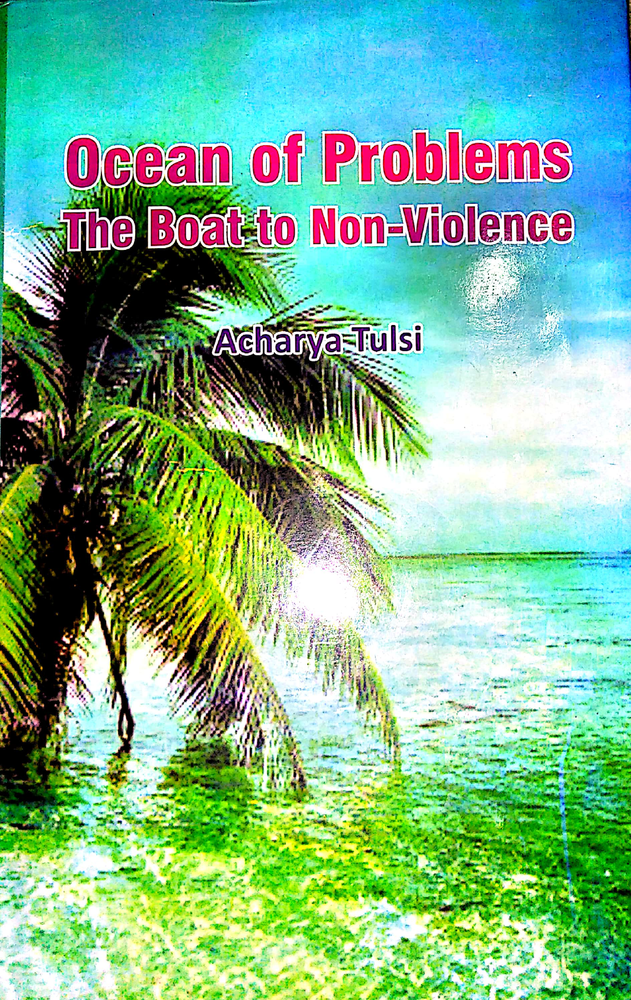In the practical world torturing or killing a living creature is considered violence and from philosophical point of view killing a living creature influenced by anger and resentment is considered violence. The soul in its pure or natural state is non-violence.
Non-violence can be categorized namely into two forms- negative and positive. There is no duality in perspective among western and eastern apostles and thinkers regarding this point. They seem to agree over this point.
Non-violence is desirable in every situation. Violence is weakness of life. It is never acceptable in any given situation.
For a Muni (Saint) violence is always worth renouncing. He considers violence forbidden in mind, speech and action. This wayhe renounces violence by three jogs and three Karanas (ways). For a family person it is not possible to renounce violence this way but still he can save himself from unnecessary violence. The violence which is not necessary for the sustenance of his life can be fully refrained from.
Unable to save oneself from violence and non-violence are not the same thing. Violence that is indispensable must be caused and without it life cannot run—are two different points. Violence is violence in every situation. The exception of time, place and situation is not applicable here.
The degree in which absence of feeling is easy, to bring feeling is equally difficult in the same degree. In the language of negativity what appears to be a unity, it is not seen in the language of positivity. Non-violence replete with emotion is also not an exception to this rule.
Generally non-violence in Jainism has been defined as non-active. The simple reason for it is that unrestrained compassion i.e. service replete with emotions has not been given a place here from the view point of spiritual emancipation or penance. Only the service that is influenced by the penance of self-realization can come under the purview of non-violence.
If there is no demarcation drawn between the service of body and spiritual service then there would be no difference between attachment and following the middle path, material gratification and tranquillity of soul.
Acceptable and Unacceptable
In Jaina Philosophy Jeeva (living creatures) and Ajeeva (non-living creatures) etc. nine such factors have been described. The last six factors—creatures (Jeeva), non-living creatures (Ajeeva), Virtue (Punga), sin (Paap), cessation of actions that creates bondage or creating bondage (Bandh) have been considered as unacceptable. But all these factors are worth experiencing or known because if a person ceases to know both these kinds of factors that are acceptable and unacceptable then how would he discriminate between acceptable and unacceptable factors in life‘? How would he renounce the factors that are unacceptable and accept the factors that are acceptable? A person buying a diamond must be able to identify both a piece of glass and diamond or he might get deceived. So Jaina Tirthankars have laid emphasis on knowing both these factors—acceptable as well as unacceptable.
Necessity of Knowledge before Behaviour
Violence and accumulation—both are worth renouncing for a saint.
According to the erudite of scriptures a person who is not well familiar with violence and accumulation can never be a saint, cannot follow the religious norms properly. In Sthanang Sutra to follow religious code of conduct the word ‘Brahmacharya’ (celibacy) has been used in reality celibacy is not merely concerned with preservation of semen, it represents the entire religious code of conduct.
For subjugation of instincts it is of utmost importance in life? How would you have a fair knowledge of violence and accumulation? A person devoid of the knowledge of violence and accumulation cannot cease to commit actions that create bondage. The most important point of all that has been depicted in the sutra is that without knowing and renouncing violence and accumulation no one can attain to ultimate wisdom.
Knowledge is Light
Knowledge is light and the base of happiness. In the absence of it life remains subdued in darkness or misery. We all have to attain to light, Set ourselves free from misery and attain to everlasting bliss. That’s why we have to attain to knowledge. But to reach the summit we have to ascend the steep cliff to know violence and accumulation and to transcend them is a step forward to ascend the steps of reaching that summit. If we move forward in this journey our endeavour would surely be successful.
Violence brings Fear
The western countries are in great plight now. They are not getting any way. If they do not become cautious even now then their existence would be annihilated by their own hand. The lethal weapons that they have created would be used over them. In the newspapers we often read that the atomic weapons are simply being tested. If they are used in war it is difficult to assume the ill-consequences of it. It is being heard that if they are fully utilized in war then some forty coming generations would also be affected by it. People would not even be able to move, they will be shattered. No matter how developed America and Soviet Russia consider themselves but even these two countries are afraid of the horrors of atomic weapons and influenced by this fear there is a competition going on over creating arms. At this hour the Indians must think of how to retain humanity and how to show the right direction to these fear-stricken nations?
 Acharya Tulsi
Acharya Tulsi
